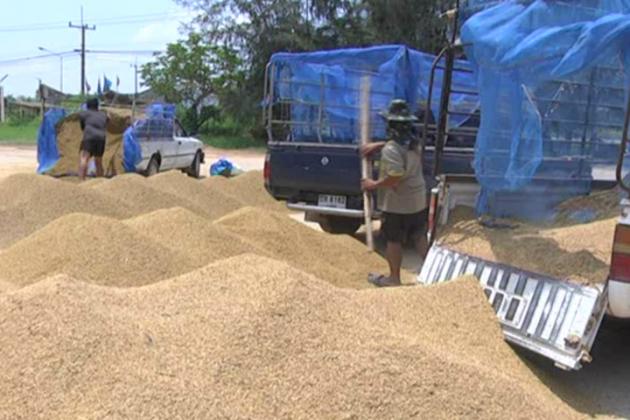Rice pledge scheme: in search of the farmers who benefit

If you ask Commerce Minister Boonsong Teriyapirom about reports that Thailand might lose its status as the world's top rice exporter to India and Vietnam, ending nearly 50 years in the top position, he will probably retort, "What's the fuss all about?\
Despite evidence from exporters and academics and the US Department of Agriculture pointing to the alarming decline in Thailand’s rice-export position, the minister suggested in his interview on Radio Thailand over the weekend that this wasn’t something he would spend sleepless nights over.
He said the first six months of this year saw a “reasonable rice export volume” and the next six months will see the government working to boost sales on a government-to-government basis.
But figures show a drop of 40 per cent in rice exports from Thailand in the first six months. Isn’t he worried? The minister wasn’t going to be drawn into discussing the export drop. He instead referred to the fact that the government was determined to pursue two of the 16 main planks in its platform: to raise the quality of life of farmers and to raise the price of agricultural products. “Hence the policy to let farmers pledge their paddy at Bt12,000 and Bt20,000 per tonne.”
On that account, he said, the government has lived up to its pledge. The price of paddy has been boosted beyond Bt10,000 per tonne, which is unprecedented. Farmers are satisfied. “We have on this score been successful.”
As for the other issue, the export decline, he insisted that the government is trying to sell more rice with government-to-government contracts. Secondly, the government is calling for auctions so that the highest bidders will buy from the government stockpiles. Third, the government releases rice stock to help subsidise prices for Thai consumers as a way of relieving economic hardship, by selling rice in one-kilogram bags.
He is confident that the whole year’s export figure could reach 8.5 million tonnes – including about 4-5 million tonnes in government-to-government contracts. But the US Department of Agriculture’s forecast for Thai rice exports this year is only around 6.5 million tonnes.
The minister no longer challenges the prediction that Thailand will be overtaken by India and Vietnam in rice exports for the first time in about five decades. Political objectives come first.
“For us to retain in our No 1 position as a rice-exporting country while our farmers continue to suffer indefinitely isn’t something we should be proud of. It’s the desire of farmers to have better living standards,” Minister Boonsong said.
The question, however, isn’t a choice between being the world’s biggest rice exporter and raising farmers’ quality of life. The critical question is whether the rice price-pledging policy has really boosted the living standards of the poorest farmers.
Several academic studies have concluded that corruption is widespread in the rice price-fixing policy, and that only certain groups of “favoured farmers” have benefited from the scheme. Politicians and their cronies have siphoned money from the paddy-pledging process, so much so that the Thailand Development Research Institute has pronounced in several studies on the issue that “corruption pervades every level of the programme”.
The government, without admitting it in so many words, may in fact already be backing down from the scheme, not necessarily to deflect the corruption allegations. The dramatic drop in rice exports is not only hurting the ruling Pheu Thai Party’s popularity, but has also put a dent in its support base in some vital urban areas. The overall decline in the country’s export picture has also sent a wake-up call to the ruling quarters in recent weeks.
But before the back-pedalling takes place in any obvious way, the government will have to produce sufficient evidence to prove there are in fact some poor farmers who have become richer as a result of the pledging scheme.
Otherwise, it will be embarrassingly obvious that the additional wealth produced by this scheme will in fact show up in some politicians’ personal assets.
RELATED
